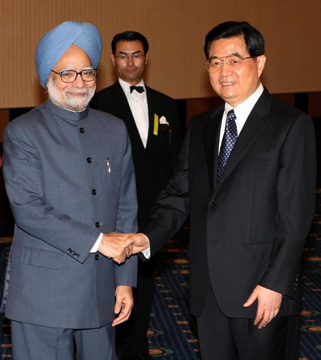G8 Summit Fails Again:
New Bretton Woods, Now!
by Helga Zepp-LaRouche
| Mrs. LaRouche is the chairman of the Schiller Institute and\Civil Rights Solidarity Movement (BüSo) in Germany. This article was translated from German, and subheads added. |
Before our eyes, the world financial system is disintegrating at an ever more dramatically increasing rate; the G8 states are meeting for their annual summit in Japan—and the systemic collapse is not even a topic on its agenda, let alone are they finding a solution for ending the crisis! These governments’ collective avoidance of reality continues to mislead them into looking for escape-hatches within the confines of the collapsing system—escape-hatches which in fact don’t exist. Considering the fact that this is the collective wisdom of the governments of the seven leading industrial nations, plus Russia, and that the weal or woe of the vast majority of humankind hinges on their expertise, we can only speak of this as a tragedy, in the Classical meaning of that term.
 Helga Zepp-LaRouche |
In no time at all, it’s going to dawn on even the dullest ignoramus, that there’s nothing in this universe that can save the current global financial system. Freddie Mac and Fanny Mae, the two U.S. mortgage giants, are “insolvent,” according to former Federal Reserve governor William Poole. “The financial crisis has returned in full fury,” according to Spiegel-online. The Financial Times Germany edition headlined “There’s Blood on the Floor in Zurich’s Financial Center.” The Danish Roskilde Bank is collapsing. The mortgage and real estate crises are escalating in the United States, Great Britain, Spain, and other countries, and more investment banks, such as Wachovia, JP Morgan, Lehmann Brothers, UBS, and Créadit Suisse, are on the skids. In Austria, the government is supposed to shoulder the liabilities of Bawag Bank. The death-gyrations of the American airline companies are making another round, with mass layoffs of another 20,000, while in Germany, Siemens is firing almost 18,000 employees. And the list goes on.
The intensifying crisis of the government-backed mortgage financing companies Fannie Mae and Freddie Mac “signals the final collapse of the Greenspan bubble,” commented Lyndon LaRouche. “This is not a crisis of these two institutions. It is the concentrated collapse of the entire globalized debt bubble Greenspan created—falsely called the ‘U.S. subprime mortgage bubble’—falling onto these two institutions. And it signals that the next phase is the total explosion of the entire financial system.” In the event that the U.S. government intervenes on these two institutions—whose stock value plummeted by almost 50% on July 11—and takes them over, it will be the taxpayers who must pick up the tab, while the problem of the systemic crisis will remain unaddressed. For we must keep in mind that the primary function of these two institutions, has been to keep the bubble economy pumped up, by turning debts into assets which could then be resold as structured securities.
One well-placed source in the financial sector stressed that something gigantic, of unfathomable and unimaginable proportions, must be done by Aug. 1, or the world financial system will collapse completely. If the Americans could only think through the implications of Freddie Mac and Fanny Mae’s bankruptcy, he said, they would realize that we’re in the greatest financial crisis of all time. But instead, they’re all leaving on vacation, as if everything were just fine.
 G8 Photo G8 PhotoRussian President Dmitri Medvedev in Hokkaido Toyako at the summit, July 8. He offered cooperation in nuclear energy to all countries that want it. |
 Government of India Indian Prime Minister Dr. Manmohan Singh and Chinese President Hu Jintau at the summit. Their bilateral discussions, including on close cooperation for nuclear energy development, were probably more significant than the multilateral summit itself. |
In the month of June alone, financial institutions in the United States repossessed 110,000 family homes, and foreclosures were announced for an additional 250,000 homeowners. The number of such repossessions is four times greater than at the height of the Great Depression of 1933, and since July 2007, approximately 3 million homeowners have been in foreclosure proceedings, while $3.5 trillion in real estate value has been obliterated. The flood of foreclosures has, in turn, caused real estate prices to collapse, and many homeowners with mortgages they thought were secure, are now left with a house that is worth less than their mortgage; and so the spiral continues downward.
Hyperinflation and Austerity
The financial oligarchy’s determination to keep its failing institutions afloat just a few days longer, even if it means hyperinflation, is typified by a press conference which International Monetary Fund Managing Director Dominique Strauss-Kahn gave on the side at the G8 summit. He recommended that the G7 countries’ financial authorities should keep extremely careful watch over their respective financial sectors, and should come to the rescue of all institutions that get into difficulty, with injections of liquidity.
Now, that is truly outrageous: It’s precisely the same “helicopter” strategy which earned Federal Reserve Chairman Ben Bernanke his nickname: the crazy idea that in an emergency, it would be better to fly helicopters over American cities and drop banknotes, than to permit large financial institutions to go bankrupt. And this, knowing full well that the resulting hyperinflation would devour the savings of all the so-called little people.
Just how the neoliberal oligarchy envisions the continuation of the crisis, is as clear as day: massive reductions in the population’s standard of living, in the tradition of Hitler’s Economics Minister Hjalmar Schacht. Strauss-Kahn presented the brilliant idea that price inflation in energy and food should be fully passed on to consumers, since this would create an incentive for producers to increase their production, while for consumers it would be an incentive to reduce consumption. And in typical British “lady-do-rightly” manner, he suggested that there be a safety net for the poor. Lorenzo Bini Smaghi, a member of the European Central Bank’s board of directors, blew on the same horn, arguing that the sacrifices which the population will have to make, must be distributed evenly.
The fact that for the majority of the population, who in recent years haven’t been able to accumulate savings, such a “reduction of consumption” and “equal distribution of sacrifice” mean a further plunge into poverty, with incalculable social and political consequences, is evidently a matter of indifference to these incompetents, whose own personal salaries would not be affected in the least by such a “distributed sacrifice.”
One Contradiction After Another
The only positive result coming out of the G8 summit, was their unanimous commitment to a renaissance of nuclear energy worldwide—except for Germany, of course. Russian President Dmitri Medvedev announced the massive expansion of nuclear energy in Russia, as well as international cooperation with all countries which desired it. Perhaps more important than the G8 summit itself, was a bilateral side-meeting between Indian Prime Minister Manmohan Singh and Chinese President Hu Jintao, where they agreed on their countries’ close cooperation in nuclear energy development.
Within the G7 states, however, one contradiction is piling on top of another, with the interests of nation-states sharply clashing with the ideology of the neo-liberal free-trade faction. French President Nicolas Sarkozy, for example, assured the European Parliament in Strasbourg that under no circumstances would he sign the final documents of the World Trade Organization’s so-called Doha Round, which has been set to occur at a meeting on July 21 in Geneva. Admittedly, Sarkozy used a free-traders’ argument that Brazil and China are also refusing to open their markets; but his real, more compelling reason, was surely the 100,000 agricultural jobs that would be eliminated in France, were the Doha agreements to go into effect. The WTO had made a desperate attempt to push the negotiations through by early June at the very latest, so that governments could get the required arrangements into place while the Bush Administration was still in office.
But the G8’s inability to even put the problem of the systemic crisis onto its agenda, or to give serious consideration to a new financial architecture, is a sure sign that, very soon now, there will be an extremely rude awakening for governments who have insisted on clinging to their ideological prejudices. Just as the Communist system collapsed in 1989-91, so also the speculative system, which was started at the latest by Richard Nixon in 1971, and which, starting in 1987, was puffed up by Fed Chairman Alan Greenspan into the most immense casino economy the world has ever seen, is now finished. The invention of derivatives and other “creative financial instruments” created a global monster which has led to the absolutely unpayable indebtedness of the system, along with huge mountains of unmarketable structured financial securities.
No Breakthrough in Europe
The European side of this monster was bestowed upon us by Margaret Thatcher and François Mitterrand with the Maastricht and Amsterdam treaties, the currency union, the Stability Pact, and the Treaty of Nice. Thanks to these, we now have the bubble economy of the so-called catch-up economies, and in Germany, the collapse of the Mittelstand—small and medium-sized industries—and the past decade’s reduction of real wages. The only ray of light in this otherwise dismal picture, is the Irish people’s “No” on the referendum on the proposed Lisbon Treaty for European supranational government, and the subsequent declarations from the Presidents of the Czech Republic and Poland, that the Lisbon Treaty is a dead letter.
What has unfortunately become all too clear in this attempted coup from above, in which heads of government had sought to impose the EU Treaty in a cloak-and-dagger operation without any public discussion, is that democracy in Europe is in miserable shape. Even now, after the Irish “No” has at least ensured that the population knows that the Lisbon Treaty exists, there has not been a single in-depth analysis or presentation of the treaty in the media, with the exception of a brief talk show on the Phönix network. If it is true that Germany’s Chancellor Angela Merkel actually did demand that President Horst Köhler sign the EU Treaty right now, even though the Constitutional Court’s decision on relevant cases is still outstanding, then this is a truly hair-raising deficit in democracy, in a woman who, already back in 2005, said on the occasion of the 60th anniversary of her party, the Christian Democratic Union: “For truly, we do not have any legal claim to democracy and the social market economy for all eternity.” So, what, then? Dictatorship?
A Solution Can Still Be Implemented
One thing is clear: The world is now facing shocks of an extent heretofore unknown. Lyndon LaRouche’s proposal that it is only if the world’s four most powerful nations—the United States, Russia, China, and India—join in cooperation, that a solution can be found for a new financial architecture (a “New Bretton Woods”) may seem unlikely to many, but under the crisis conditions we are now headed for, it is not so. The world’s people are currently thinking about solutions: for example, a continental Eurasian solution, without the U.S.A. and Great Britain, or a strictly Asiatic or South-South solution, or a ruble zone, or a British-Scandinavian zone, etc., etc. But already in the 15th Century, Nicholas of Cusa recognized that universal problems cannot be solved on the basis of side-arrangements, and that concordance in the macrocosm is only possible if all microcosms develop into a harmonious whole.
And so, even if today this might appear unlikely to most citizens, the only way to prevent humanity from being plunged into a really dark age, lies in our ability to establish a new and just world economic order, one which can secure the survival of all people and all nations, in human dignity. And the best thing that we in Germany can do, is develop ourselves into true citizens of our country.
Related pages:
Call to Double World Food Supply
More Helga Zepp-LaRouche Articles and Presentations
Helga Zepp-LaRouche's New Call for a New Bretton Woods
